The hardest part is behind - you have safely transferred the birth and are now at home, and the baby is fast asleep in his crib. The husband is crazy about happiness and loves you even more. Relatives and friends fill up with congratulations and gifts. In short, live and rejoice. And you want to cry. You feel the anxiety that comes from no where. It seems as if something is about to happen, and all good things will dissolve like a dream. Do not be alarmed, you are not the only one with whom this happens. Such feelings are experienced by all women in the first few days after childbirth.
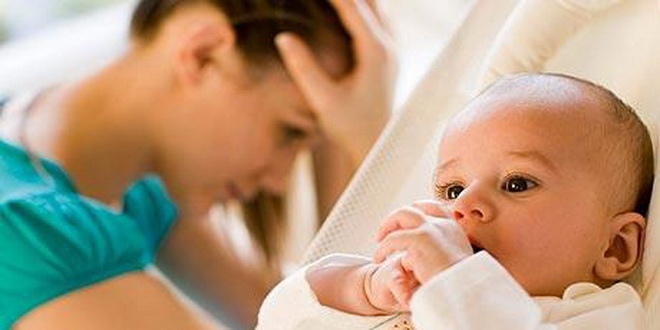
However, in ~ 50% of women, this depressed state is delayed and already ceases to resemble ordinary sadness or experience. This condition is called postpartum depression. In women, it can manifest itself to a lesser or greater extent, briefly or drag on for many months. Postpartum depression occurs in 50% of women, in 13% it occurs in severe form.
Postpartum depression - a woman’s painful condition after childbirth, characterized by a depressed mood, tearfulness, unwillingness to see her baby, reversible mental disorders. In most cases, PD is not very pronounced, but in severe cases, the mother may even have a desire to kill herself or the child. Such women require treatment in special institutions.
Video # 1: On Postpartum Depression
Signs and causes of depression
- You often cry, sometimes several times a day. For no reason, you can suddenly get upset and burst into tears. Reasons for tears are the most insignificant, which you would not even have noticed before;
- Whatever you do, there are annoying thoughts in your head that: something is wrong with the baby, nobody loves you, everything will end badly, the world will collapse tomorrow and the like. Moreover, the thoughts are obsessive in nature, you can not get rid of them and think about something else. Because of this, you can’t fall asleep for a long time, which leads to lack of sleep and aggravation of poor health;
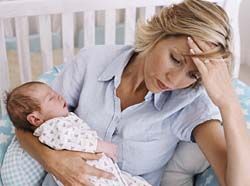
- Scrolling through obsessive thoughts in your head, you begin to search for their cause in yourself. And, of course, find: the appearance is not the same as it was before, there is no free time for her husband. And you conclude: of course, who needs me so fat (groomed, tired, sad or something else), in general, you begin to develop a sense of inferiority in yourself;
- Responsibility for the child, increased many times after the birth, turns into a feeling of fear for him. You constantly shake over the baby, the most insignificant signs of malaise in a child lead to panic. At night, you jump up and check the baby’s breathing many times.
All of the above exhausts a woman and makes her irritable.There is an internal emptiness and indifference to everything that previously was pleasing and pleasing. A woman becomes indifferent and indifferent to her husband, it may seem to her that love for him has passed. Moreover, all the men in the world become disgusted with her.
Apathy reaches such an extent that it is manifested by indifference to the child, unwillingness to care for him, even to the point of hostility.
The reasons:
- sharp hormonal changes that occur during and during childbirth;
- psychological unpreparedness for motherhood or his unwillingness;
- physical exhaustion of the body, fatigue, overstrain, difficult birth, material or family distress;
- hereditary, age-related (after 40 years) or personality predisposition to depressive states.
Somatic symptoms may add to everything else.
Somatic symptoms:
- common headaches or migraines;
- palpitations, dizziness;
- digestive upset (loss of appetite, constipation);
- neuralgia;
- itchy skin;
- insomnia, nightmares, suicidal thoughts, the desire to harm yourself or your newborn;
- menstrual irregularities or the disappearance of menstruation, frigidity.
Video number 2
Psychologist Anna Galepova tells about postpartum depression, anxiety, and fears for a child:
Fighting Depression
With a mild degree of postpartum depression, you can get rid of it yourself. The most important thing is the woman’s understanding that this condition is temporary and in order to get rid of this condition a certain self-adjustment is needed.
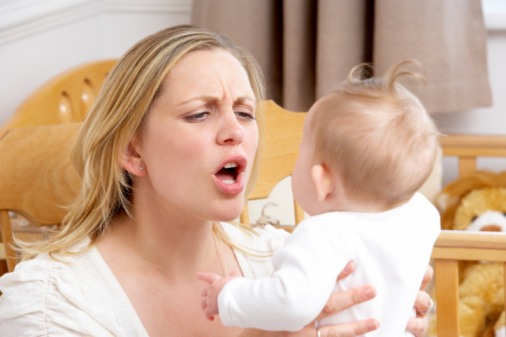
- More often remind yourself that a miracle happened in your life, many of which you can only dream of. Remember what you had to go through to make this miracle happen. Thank God (fate) for the fact that everything went well, everyone is alive and well. Feel the peculiarity of your situation, then the home routine repents to you the little things in life.
- Think about how the baby needs your love now that he is helpless in a new world for him. Often take the baby in your arms, stroke it, talk gently. Tactile contact and breastfeeding contribute to the development of “hormones of happiness”, which will help to fully experience the joy of motherhood, tenderness and love for the baby.
- Whatever the circumstances, try to understand that you are not alone now. A man has appeared in the world whose well-being depends on you.
- If possible, be sure to allow yourself to be alone with yourself. Each person should have a personal life and personal time, otherwise he loses his personality and becomes depressed. Have a day off when your husband is at home. Many women at first are afraid to leave their babies with their fathers - sort it out. An increased sense of responsibility will only drive you into even greater depression. Pick up the phone and go shopping, go to the movies, or go to the hairdresser. If it’s tight, they’ll call you. Even breastfeeding should not interfere with a full life, a breast pump is your good helper in this matter (how to choose and use a breast pump).
- Do not be ashamed of being overweight - this is a temporary natural occurrence. Extra pounds will leave you within a year, especially if you are breastfeeding, because the fat accumulated during pregnancy goes into milk (how to lose weight after childbirth).
- Get enough sleep. Do not take all the cares on yourself, leave some of them to your husband, grandmother, grandfather or nanny. You must have an assistant. If you feel that you are tired, choose rest, but not cleaning and cooking.
- Do not listen to those who give you advice to go on a diet for weight loss or to exclude a bunch of products from your diet, fearing allergies in the child. If you are a nursing mother, eat whatever you want and how much you want, excluding obvious allergens. Right now you need to fully eat and gain strength after stress (feeding a nursing mom).
- The person closest to you is your husband. Do not move away from him in silent mystery. Men poorly understand the emotional state of a woman. Talk to him and tell specifically what is happening to you, what you feel, what you think, ask for help.For trust, he will only be grateful to you.
- Do not bury yourself alone. Communicate with other mothers, talk heart to heart. Surely you will meet women with the same problems. Perhaps some of them managed to solve them or you will become like-minded people in this struggle. In any case, this will be support for you.
- Many relaxing and meditative techniques (aromatherapy, bath, massage) teach how to cope with depression on their own. At first, newborns sleep a lot, so you will have time to relax, read, and just do nothing.
When you need specialist help
What if all this does not relieve depression, and you no longer understand how to get out of this state? 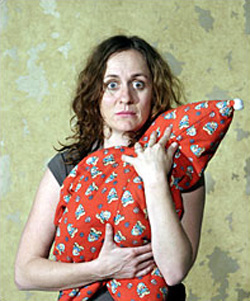 Perhaps you should consult a specialist. It is better if it is a perinatal psychologist or a psychotherapist. First, it will be necessary to remove the anxiety state, fears. The doctor will help you relax, normalize your mood, return to the natural perception of life. Different techniques can be applied: NLP, psychoanalysis, hypnosis or others, depending on the skills of the specialist and those factors that caused postpartum depression.
Perhaps you should consult a specialist. It is better if it is a perinatal psychologist or a psychotherapist. First, it will be necessary to remove the anxiety state, fears. The doctor will help you relax, normalize your mood, return to the natural perception of life. Different techniques can be applied: NLP, psychoanalysis, hypnosis or others, depending on the skills of the specialist and those factors that caused postpartum depression.
Further, the psychotherapist can offer you to undergo family cognitive psychotherapy sessions, during which internal family problems, children's complexes, resentments and all that can again return you to a depressed state will be worked out after some time.
The treatment is consolidated by analyzing negative scenarios and changing the lifestyle and attitudes of women to problems.
In severe cases of depression, women are prescribed antidepressants or sedatives. But due to the high toxicity they are taken in exceptional cases. If it is impossible to refuse drugs, you have to sacrifice breastfeeding.
Prevention
Prevention of depression is to inform a pregnant woman about possible changes in her emotional state after childbirth.
In most cases, a woman, understanding the cause of a depressive mood, is able to control her emotional background herself and get out of this state after some time. The support of relatives and spouse during pregnancy is important. Healthy, warm relations in the family are the key to the fact that the postpartum period in a woman will pass safely. Especially should be closely monitored by a woman whose status is already burdened by depressive episodes or some kind of trouble.
When passes
Women are wondering: how long is postpartum depression, because it is easier to cope with any condition knowing its timing.
A mild form of depression can occur only a couple of months, but it can drag on for six months. Severe depression without treatment can last for years.
But when the depression goes away, everyone can breathe a sigh of relief. After all, the happiness of a family directly depends on whether a woman is happy. Having defeated this state, many women then with a smile remember all their whims, tears and obsessive thoughts, and forget what they went through. No one is immune from the disease, the support of loved ones and a therapist will speed recovery.
Read on:
Video Stories
Lecture
Postpartum Depression: Myth or Reality?
Postpartum depression - is it really a serious condition of the body and spirit or just an invention of hysterical mothers who do not know how to control themselves? What are the causes of postpartum depression and how to avoid it?


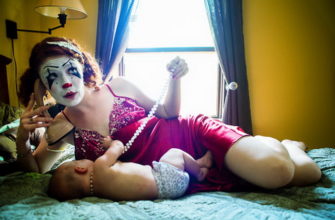

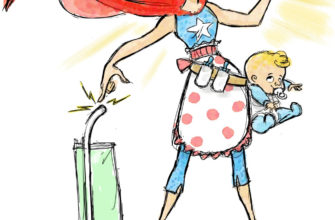




It seems to me that outdoor recreation would be very effective, and you can take your baby with you. Just triple a picnic, or settle on the banks of the river, go fishing or swimming. In such cases, the main thing is to get distracted, get out of the wheel, into which we constantly get, being at home. Then you can and feel much better with;
Now this condition after childbirth is quite common. I encountered this on the example of my daughter. She had terrible postpartum depression. She was very worried about the baby. I had to even consult a specialist. His advice was very correct. The main idea was what to take to pull yourself together and think about the child are only positive things. It is very difficult to get rid of this condition. It can really take a long time.
When I had postpartum depression, there was no one to tell me how to deal with it and no one helped me, so the realization that I and only I was responsible and should take care of my baby brought me back from a tearful state to reality. This is how depression was defeated 🙂
I especially manifested this condition when the child yelled for the first couple of months. There was confusion and fear that often you could not help him with anything. Cried with him and it became easier. Signs of depression passed when the child began to smile at me.
I, probably, like many girls faced this condition a couple of days after discharge from the hospital. At first there were wild bouts of happiness and love for my baby. Then came the period when tears welling up just like that even from the songs they heard. I looked in the mirror and just started a tantrum. I was lucky that at that time my mother was next to me. It was she who helped me to cope with this problem. Her support helped me overcome all complexes and fears.
I found out what postpartum depression is after the birth of my second daughter. Hands fell, could not do anything. My husband began to look at me differently, and it seemed to me that I could never return his love. If a friend had not forced me to go to a psychologist, then I probably would not have had a husband.
I faced postpartum depression, leaving the hospital, cried for two weeks! It is a pity that it was impossible to take antidepressants, as she was breastfeeding. Thank God, my beloved husband helped me out of depression with my care and support.
Massage is a good way to relax and get a charge of positive emotions for the whole day and get rid of postpartum depression.
Acupuncture in postpartum depression increases a woman's energy lost as a result of childbirth.
The characteristic signs of depression include fatigue, a sense of self-failure, a sharply reduced self-esteem, sleep disturbance, emotional dependence states combined with tyrannical claims. Cases of traumatic neurosis after a difficult birth Bydlowski and Papiernik described women who in the past survived a difficult birth with a threat
Hello everyone! I really need help .. I gave birth 2 months ago. After about 2 weeks after discharge, depression started. The obsessive words of the curse revolve around my head. I don’t know where they come from. Basically this refers to my little son. It started on the Internet that the thought is material. I love my son but I don’t know what to do and I'm afraid. I don’t want to lose him